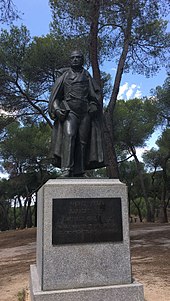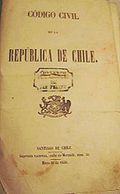Andrés Bello
Andrés Bello (born November 29, 1781 in Caracas , Venezuela , † October 15, 1865 in Santiago , Chile ) was a Venezuelan-Chilean diplomat , legal scholar , philosopher , philologist , translator and poet . He founded the Chilean National University , of which he was the first rector, and created the Chilean Civil Code of 1855 , one of the earliest and groundbreaking codifications in Latin America to this day .
Live and act
Andrés Bello grew up in Caracas in the General Capitanate of Venezuela , which was part of the then Spanish viceroyalty of New Granada , and as a child was an avid visitor to the libraries near his parents' home. At the University of Caracas he obtained a Baccalaureus Artis degree with excellent grades and then made a name for himself as a tutor for the families of the upper class of Caracas. For a short time he was also the teacher of Simón Bolívar . In 1800 he accompanied Alexander von Humboldt , whose works he later translated into Spanish, on part of his trip to South America. He broke off his studies in law and medicine, which he had begun in 1800, in favor of a civil servant career, but soon became mainly an intellectual, publicist and poet. In addition to his poems, he became known for translations of parts of the Aeneid and Voltaire's tragedy Zulime . In 1808 he took over the management of Venezuela's first printed newspaper , the Gaceta de Caracas , and became the most influential figure in Venezuelan literature during and after the Wars of Independence.
During the Wars of Independence in Venezuela from 1810, Bello went to England on behalf of the Venezuelan patriots and was Venezuela's diplomatic representative in London until 1813 , where he stayed until 1829. Here he met Francisco de Miranda and became a frequent visitor to the British Museum . He also took on diplomatic tasks for Chile and Greater Colombia . In 1822 he was employed as a legation counselor for the Chilean mission abroad. In 1824 he married Isabel Antonia Dunn.
As a co-founder of the Society for American Poetry , he worked significantly on important philological and literary journals (such as El Censor Americano or La Biblioteca Americana ) and was editor of the journal El Repertorio Americano . His best-known poem Silva comes from 1826.
At the beginning of 1829 he left England together with his wife and settled in Chile, whose citizenship he had received on account of honor. In 1830 he became rector of a college in Santiago de Chile and founded the journal El Araucano . He also held various government offices in Chile several times. In 1842 he founded the Universidad de Chile , whose rector he remained until his death. In 1851 he was made an honorary member of the Real Academia Española .
For more than 20 years, the scholar worked on the codification of Chilean civil law and in 1855 presented the draft for a Código Civil de Chile to the Chilean President Manuel Montt Torres , who submitted it to the National Congress for approval. The code came into force on January 1, 1857. Bello was then appointed senator in Chile. He is considered to be a representative of a positivist legal philosophy , which was spread in America earlier than in Europe, partly because of its work, and regarded the law as the only source of law with a claim to comprehensive content and exclusive validity. The civil code of 1855 was comprehensively received in several Latin American countries, in some cases even adopted almost word for word (for example in Ecuador , Colombia and El Salvador ).
As a linguist , Bello feared a similar fate for the Spanish language in the now independent countries of Hispanic America as Latin experienced with its splitting up into the various Romance languages . Bello was a powerful advocate and is considered the actual founder of Latin American national literature. The declared aim of his grammar was to contribute to the unity of the Spanish language, with which he also attempted to differentiate himself linguistically from Europe. In the 1820s he developed a pronunciation-oriented reform spelling, completed in 1835, which was completely official in Chile for a few years from 1844 and in a weakened form until 1927, and which at times also spread in other countries in Hispanic America .
Appreciations
He is the namesake of the Universidad Católica Andrés Bello in Caracas, founded in 1953, and the Universidad Nacional Andrés Bello in Santiago de Chile, founded in 1988 .
The image Bellos found since December 1998 on the 20,000- Peso - banknote Chile.
In Venezuela, the Andrés Bello Order of Merit ( Orden de Andrés Bello ) is awarded in several classes.
The asteroid of the inner main belt (2282) discovered on March 22, 1974 Andrés Bello was named after him in 1981 on the occasion of Bello's 200th birthday.
Works (selection)
- 1847 Gramática de la lengua castellana destinada al uso de los americanos ("Grammar of the Spanish language for American use") contrastiva.it (PDF)
- 1855 Código Civil de Chile ("Civil Code of Chile")
- Naissance d'une pensée latino-américaine ( Collection UNESCO d'œuvres représentatives , 1986)
literature
- Ralf Weißkopf: The Chilean orthography. In: Joachim Christl, Sandra Ellena, Andrea Landvogt (eds.): Philological borderline cases or the squaring of the circle (FS Wilhelm Pötters ). ibidem- Verlag, Stuttgart 2012, ISBN 978-3-89821-500-8 , pp. 453-462.
- Katja Carrillo Zeiter: Translation between education and aesthetics with Andrés Bello. In: Birgit Scharlau (Ed.): Translate in Latin America (= Frankfurt contributions to Latin American Studies, 9). Gunter Narr Verlag, Tübingen 2002, ISBN 978-3-8233-4049-2 , pp. 71-85.
- O. Carlos Stoetzer: Bolívar and Europe (1783-1830). In: Wilhelm Stegmann (Ed.): Simón Bolívar. Personality and impact. Dietrich Reimer Verlag, Berlin 1984, ISBN 978-3-4960-0762-3 , pp. 59-74 (on Bellos: pp. 60ff.).
- O. Carlos Stoetzer: The Political Ideas of Andrés Bello. In: International Philosophical Quarterly , Volume 23 (1983), pp. 395-406, doi : 10.5840 / ipq198323447 .
Web links
- Literature by and about Andrés Bello in the catalog of the Ibero-American Institute of Prussian Cultural Heritage, Berlin
Individual evidence
- ↑ a b Georg Wink: The idea of Brazil. A cultural-scientific investigation of the narrative of Brazil as an imagined community in contrast to Hispano-America (= Hispano-Americana, Volume 38). Peter Lang, Frankfurt am Main 2009, ISBN 978-3-631-58741-6 , p. 106 u. Note 337.
- ↑ Georg Wink: The idea of Brazil. Frankfurt am Main 2009, p. 110.
- ↑ Markus Jakob: A sound, a letter? In: NZZ , August 20, 2004, accessed on October 2, 2018.
- ^ Lutz D. Schmadel : Dictionary of Minor Planet Names . Ed .: Lutz D. Schmadel. 5th revised and expanded edition. Springer Verlag, Berlin / Heidelberg 2003, ISBN 3-540-00238-3 , pp. 185 , doi : 10.1007 / 978-3-540-29925-7_2283 (English, 992 pp., First edition: 1992): “Named for Andrés Bello, Venezuelan intellectual”
| personal data | |
|---|---|
| SURNAME | Bello, Andrés |
| BRIEF DESCRIPTION | Latin American politician, humanist |
| DATE OF BIRTH | November 29, 1781 |
| PLACE OF BIRTH | Caracas , Venezuela |
| DATE OF DEATH | October 15, 1865 |
| Place of death | Santiago de Chile |


